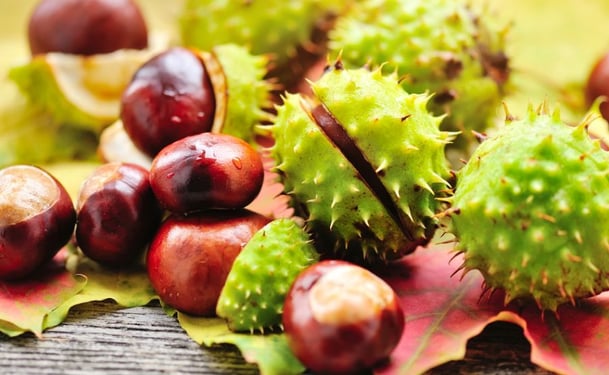In herbal and alternative medical practices, horse chestnut is used in varicose veins treatment. It is an herbal remedy procured from the leaves, seeds (conkers) and bark from the Aesculus hippocastanum tree. Fresh or raw horse chestnut should not be consumed, as it can be very toxic.
Small doses of the herb may reduce swelling and inflammation associated with varicose veins. For centuries, horse chestnut has been used in Europe as a treatment for several venous conditions. Research conducted in Europe indicates that horse chestnut may improve the function of the veins.
Properties
Horse chestnut contains Aescin, a compound that is believed to help protect and improve collagen found in the structure of the veins. Along with its anti-inflammatory properties, it also works as a diuretic. The diuretic properties can relieve the swelling and discomfort caused by fluid retention.
Fresh horse chestnut contains esculin. Esculin is a toxic substance that may cause seizures, vomiting, paralysis and death. Extract that has been commercially prepared does not contain the esculin. The toxic substance is removed by the manufacturer during processing.
Horse Chestnut and Pre-Existing Conditions
The safety of horse chestnut used during pregnancy and lactation in unknown; therefore, women who are pregnant or breast-feeding should not use this herb. Individuals with kidney or liver disease should not use horse chestnut, because these condition may worsen with the use of horse chestnut.
Patients who are diabetic should take care when using the herb. Horse chestnut has been known to lower blood glucose levels in some individuals. Patients suffering from gastrointestinal conditions should not use horse chestnut, as it may further irritate the lining of the stomach and bowel.
Contraindications
- Combined use of horse chestnut with diabetes medication may lower blood glucose to dangerous levels. Consult with your physician before using.
- Horse chestnut may further decrease the blood clotting ability in individuals taking anticoagulants.
- Horse chestnut may interfere with lithium levels in the body. Individuals taking lithium should consult with their medical practitioner before taking horse chestnut.
- A rare allergic reaction has been reported in individuals allergic to latex.



